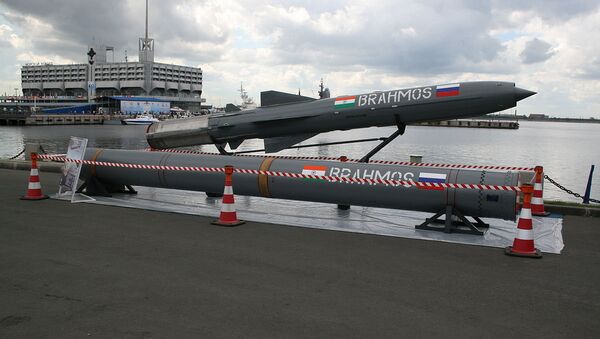New Delhi (Sputnik) — In what could save billions of dollars in defense spending, India has successfully conducted the first life extension test of the supersonic cruise missile BrahMos. The test was conducted at 10.40 a.m. (Indian Standard Time) from the Chandipur-based launching complex — III of the Integrated Test Range (ITR), near the Odisha coast.
Defense sources told Sputnik that the land-attack version of the missile system met its mission parameters in a copybook manner. India's Minister of Defense Nirmala Sitharaman has congratulated the BrahMos (Indo-Russian joint venture) and the Defence Research and Development Organisation (DRDO) for successful flight testing of the missile to validate the life extension technology developed for the first time in India.
#Russia and #India are in talks on creating new models of #cruisemissiles at the #Brahmos #Aerospace joint enterprise, #Russian Aide for #Military-Technical Cooperation Vladimir Kozhin.#Pakistan #Ukraine #UnitedStates #Australia #Germany #France #Canada #TechFest2018 #tech #UAE pic.twitter.com/ErMUk7xSBm
— Technology World (@technoworld201) May 18, 2018
"The successful test will result in huge savings of replacement cost of missiles held in the inventory of Indian Armed Forces," the Ministry of Defense tweeted.
Smt @nsitharaman congratulates Team Brahmos & @DRDO_India for successful flight test carried out at 1040 hrs on 21 May 2018 from ITR, Balasore to validate BRAHMOS missile life extension technologies developed for the first time in India. 1/2
— Raksha Mantri (@DefenceMinIndia) May 21, 2018
Last year, India had successfully extended the range of the missile from 290 kilometers to 450 kilometers and it was validated from different platforms.
READ MORE: Indian, Russian Scientists Pursue Mach 7 For BrahMos Missile
BrahMos variants can be launched from land, air, sea, and underwater. While the naval and land attack version of the missile is already in service, the Hindustan Aeronautics Limited has started the work to integrate the air-launched versions of the missile in 40 Su-30 MKI fighter jets.
Presently, BrahMos travels at a speed of Mach 2.8 or 2.8 times the speed of sound. The manufacturers aim to increase the speed to Mach 7 in the next few years.

